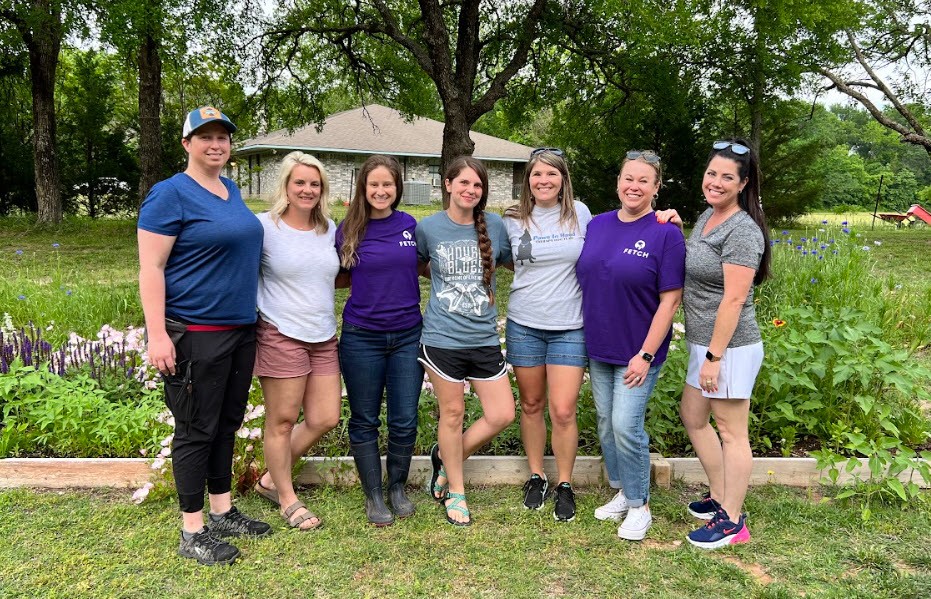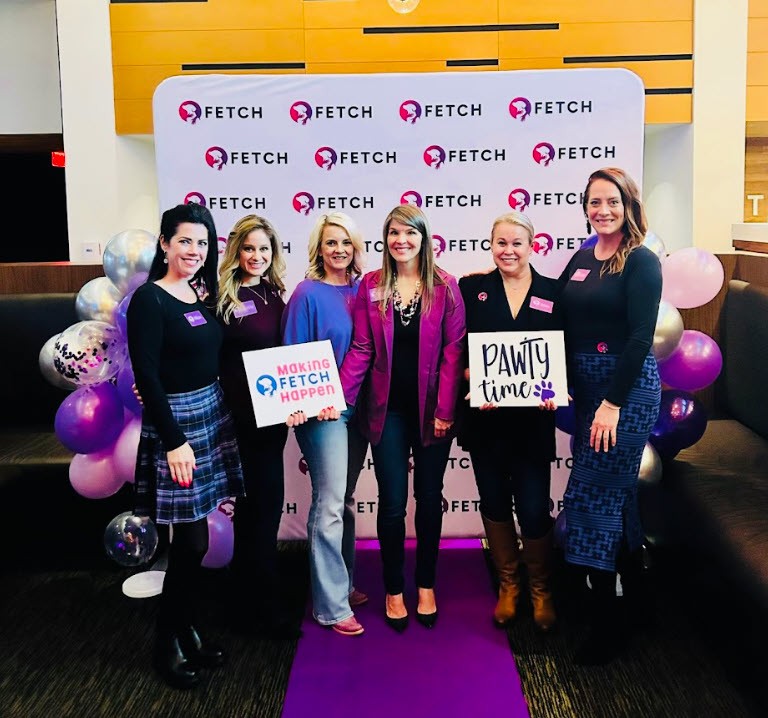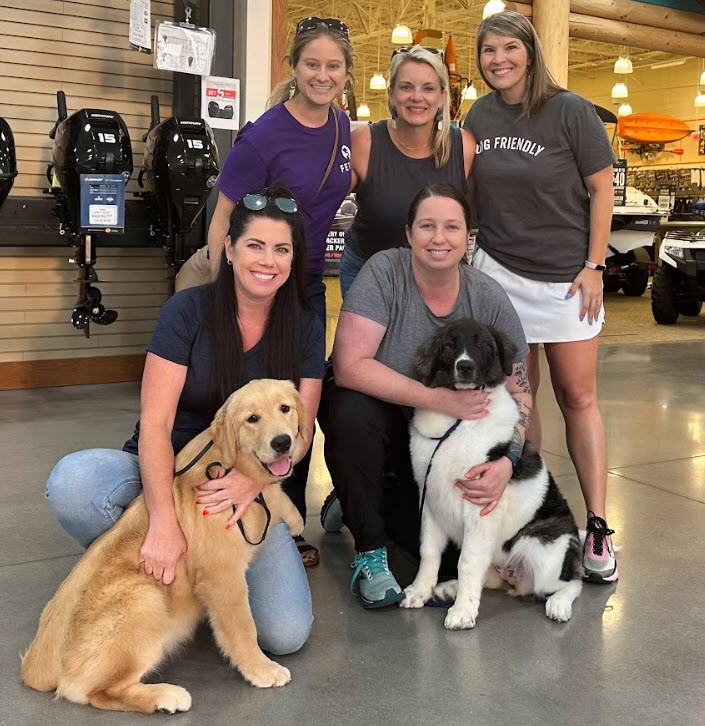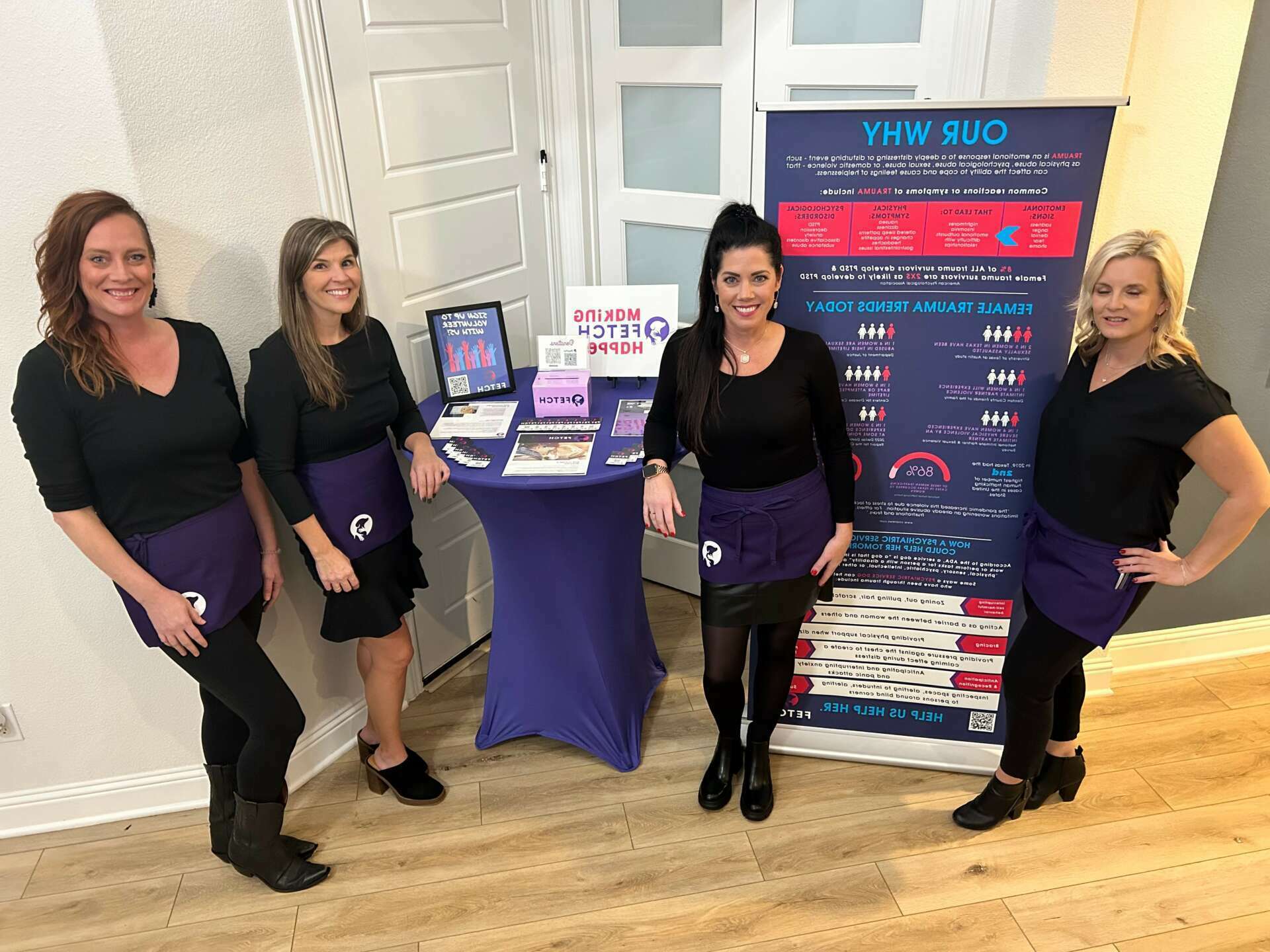We were lucky to catch up with Jennifer Baptista recently and have shared our conversation below.
Hi Jennifer, thanks for joining us today. Let’s kick things off with your mission – what is it and what’s the story behind why it’s your mission?
Our mission at Fostering Empowerment through Canine Help (FETCH) is to provide funding for a highly trained psychiatric service dog to women in the DFW area who have endured abuse or trauma so that they are no longer merely surviving but thriving, regaining and rebuilding an independent and fulfilling life.
One of the other cofounders, Lindsey Hardman, and I worked with Dexter and Ginger Morin – trainers and owners of former company Paws in Hand Canine Consulting – with our own dogs. We became such good friends along the way and even started to bounce around ideas with Dexter and Ginger of how we could create a nonprofit that incorporated dogs to help people.
Dexter and Ginger had mentioned to us a few times how they had some women reach out to their organization that would really benefit from a psychiatric service dog (PSD). These women had been through some extremely traumatic experiences, and a PSD could really help them in their healing as well as just being out in the world in their everyday lives. However, when you start talking about the cost of a PSD, this isn’t always an easy pill to swallow – especially depending upon what types of situations they are coming out of as they may just be simply trying to get back on their feet again, oftentimes all on their own.
Enter 2020 and COVID-19. Not only did we all have some extra time on our hands being stuck at home, but we saw things like domestic abuse rates jump while others were also stuck at home as well as more and more isolation from others and society. Texas Monthly noted a 20% increase in domestic violence reports to the Dallas PD after the stay-at-home orders which definitely speaks to this. Lindsey, Dexter, Ginger and I brainstormed. What if we created Fostering Empowerment through Canine Help (FETCH) – a 501(c)3 nonprofit organization that would raise money to fund the selection and training of these PSDs for women in our area who have experienced abuse or trauma? We planned to keep recipients limited to living in the DFW area for proximity to our organization and trainers and to keep down the cost (no travel for the trainers, etc). We brought in our other cofounder, Emily Stein, who Lindsey volunteers with in another service dog nonprofit and FETCH was born in December of 2020 with the help of Paws in Hands and some other volunteers with more experience in the nonprofit world.

As always, we appreciate you sharing your insights and we’ve got a few more questions for you, but before we get to all of that can you take a minute to introduce yourself and give our readers some of your back background and context?
I currently live in Frisco with my husband Alex and our 18-year-old tripawd Maltese Gizmo and our 6-year-old Goldendoodle Willow. I’ve always just really had a passion and love for dogs, but it really grew when Willow joined our family in 2018 and began training with (our original FETCH partners) Paws in Hand. What started as obedience training and hunting training quickly turned into something more when Paws in Hand saw potential in Willow at a young age to serve the community as a certified therapy dog. This is where my passion for dogs grew into a passion for HOW dogs can HELP people heal physically and mentally. As I shared in the story of our mission, the idea of FETCH and the desire to give my extra time and energy to what became FETCH came from our relationship with Dexter and Ginger at Paws in Hand as well as taking part in this therapy dog program.
Our team at FETCH currently consists of four board members and two volunteer coordinators. We all work in other full-time jobs so our roles in this organization are all 100% volunteer and done in our spare time. However, our team puts a lot of heart and hard work into this organization to not only raise funds to cover the cost of selecting and training for these psychiatric service dogs, but also to ensure that we are selecting women for our program that are at a place in their healing that will allow them be successful working with a service dog and that we are good stewards of the funding our donors provide.
While our main mission is to be able to provide the funding for these service dogs, we’ve also made it a goal of ours to create awareness and educate the community around the women we hope to serve and around service dogs themselves. We use our social media platforms and website to create and share content about the women we serve and the types of challenges they face. We also strive to share service dog etiquette and information that the general public may not be aware of pertaining to the laws and use of service dogs in their communities.
It’s also important to us to seek out and learn more from organizations that help women who have survived trauma or abuse, as well as show our support for what they are doing as we are working towards some of the same visions. Denton County Friends of the Family (www.dcfof.org) and It’s Going to Be OK (www.igtbok.org) are a couple of the organizations whose mission and programs we just love seeing in our communities.
It’s hard to really pick just one thing I am most proud of when thinking about FETCH and what we have done over the past few years together. Our current team happens to be all women (we did originally start FETCH with a male Chairman of the Board though – fun fact!). It has been really amazing to see such strong women working together to help OTHER women in our community find their own strength – and independence – through having a service dog in their lives. There are for sure other phenomenal organizations out there that help members of our community to have access to service dogs – particularly for the veteran community which of course has been exposed to a high level of trauma that results in PTSD – but we often have people share with us that they have never seen another group doing this and how glad they are that we have chosen to because it’s important. In the beginning, we didn’t know if this idea for this organization would even go anywhere. We adopted the mindset that if we were only able to help just ONE woman, that alone would be worth it. Changing ONE woman’s life could ultimately change the lives of many others… Her family. Her friends. Her coworkers. Anyone else who crosses her path in the future. Here we are starting our 4th year and we have been able to provide three women with dogs. To some it may not seem like much but for us it is HUGE. Our team has pushed forward through blood, sweat, and DEFINITELY lots of tears (especially when you hear the stories of what some women have endured in their lifetimes). We are proud of every step forward that we take together, no matter how big or small.

Have you ever had to pivot?
After building FETCH with Dexter and Ginger of Paws in Hand and working with them for 2 ½ years as our dog trainers, they were offered an incredible opportunity training guide dogs in Arizona. While we were extremely excited for them, we were nervous at the uncertainty of how it would affect FETCH and continuing our mission. How were we going to find another training organization that believed in our mission and was aligned to our process in the same way they were? Where do we even begin in finding a new partner like this? How do we determine if they are going to even be the right fit?
Emily, who was still on our Board of Directors at the time, had been building quite a network within the “dog world” for several years. Not only was she a groomer, but she also competed in several dog shows as a handler. She met a couple of potential trainers that might be a great fit for our mission while taking part in these shows, so we began meeting with them to share our mission at FETCH and see if they might be a good fit to work with us. The trainers that we were most drawn to were with a company called Scout’s Legacy Service Dogs.
This all probably seems pretty standard. You lose a partner, so you find a new one. However, working with Scout’s Legacy would mean a pivot or shift in mindset for us in the type of training program that FETCH used since the beginning.
When we created FETCH and were working with Paws in Hand, the training program used was what is considered a Fully Trained Program. In this program, the trainers had possession and responsibility of the dog and its training from the start. They would train the dog for several months to a year. When they considered the dog to be ready to graduate from the program, they would then pull in the handler. The handler would go through approximately 2 weeks of training to learn how to handle the dog as a service dog and would then test out to graduate from the program. The dogs that were being considered for selection for this program were also generally at least a year old and could come from various avenues. The two dogs that we had that graduated from this program were a 4-year-old German Shepherd that aged out of a guide dog program but would still be great as a PSD and a 1-year-old Parti Poodle that was returned to a breeder because the family was unable to continue to care for the dog.
The program that would be available to us through Scout’s Legacy would be quite a change from what we were doing with Paws in Hand. The training program they could offer us at the time we were to take on this new partnership is considered an Owner Training Program. In the Owner Training Program, handlers will have possession and responsibility of the dog and its training from the start to finish under the guidance of Scout’s Legacy’s professional trainers. The handler is required to communicate with the trainers on a regular cadence (including providing photos and videos of skills they are working on) as well as participate in outings where they receive face-to-face interactions with the trainer in public places. They are required to complete a final test to graduate from the program. The dogs our organization chose to utilize for selection in this process are selected as puppies through one of Scout’s Legacy’s approved breeders. These puppies are required to meet Scout’s Legacy’s requirements pertaining to their temperament and health and family history of their bloodline to ensure that the dog will have a long, successful career as a service dog.
You can see these are two very different strategies for selection of the dog and training programs. When we moved to working with a trainer that used the Fully Trained Program style to one that used the Owner Training Program style, we had to put a lot of thought and consideration into making this change. We had many conversations and meetings with Scout’s Legacy and listened to their success stories of the program. We also had the opportunity to attend an outing and speak to clients directly about how they felt about this program. Our Board did not take this decision lightly. We needed to consider our recipients first and foremost and how this change would affect them. We needed to consider how it would change the conditions of the contracts both us and our recipients were signing. We needed to consider how it would change our process and the offerings of it. It was a huge pivot for us, but we are so happy with this partnership. Changing our mindset to try it a different way has allowed us to find a way to continue working towards our mission.

What’s worked well for you in terms of a source for new clients?
Building relationships with counselors and programs that help women in DFW who have experienced abuse or trauma has been the most successful way for us to find recipients for our program.
We meet with them and discuss what our vision is for FETCH as well as the attributes that both us as an organization funding the service dog and our trainers see in an ideal recipient to have the most success in the programs being used for training. Since these counselors and programs have done a lot of work up front with these women, they have essentially done some of the “upfront” analysis of if she will benefit from a psychiatric service dog and if she will be successful in the program we are utilizing. They can then choose to share our program with someone they determine is a good candidate and will have us send the woman an application if they end up being interested. It also helps us to determine how we can support THEIR programs or organization best and how we can be good partners to them.

Contact Info:
- Website: www.fetchdfw.org
- Instagram: https://www.instagram.com/fetchdfw/
- Facebook: https://www.facebook.com/FETCHDFW
- Linkedin: https://www.linkedin.com/company/fetch-dfw/


